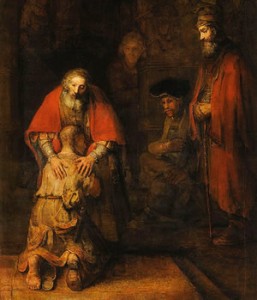24th Sunday in Ordinary Time – Cycle C (Lk 15:1-32)

Rembrandt – The Prodigal Son
God is merciful, full of love, compassion, and forgiveness, even when we ignore Him and worship false gods. When the people of Israel turned away from God, God threatened but did not punish His chosen people. God had mercy on them and forgave them, even when they rejected His covenant with them.
But aren’t we often guilty of the same? How many of us seek to attain more than we need, all that we desire? More money, bigger houses, fancy cars, more, more, more, always more and better stuff. Aren’t we just as guilty when we place ourselves and our possessions before God?
False worship takes on many forms. The prodigal son wanted his freedom and his inheritance, far more than he deserved, certainly more than he had earned. He declared his father dead and worshiped on the altar of idolatry by his life of dissipation. And when he came to his senses and went crawling back to his father, he fully expected, rightfully so, to be treated as the dissolute reprobate that he had become, to get what he really deserved. But what he got from his father was completely undeserved. Instead of disdain and rejection, he received forgiveness, mercy and unconditional love.
God does not wish to deny us from having those things that bring us enjoyment and pleasure. All He asks is that we love Him above all things and before all else.
St. Augustine, in his Confessions described how the desire to possess things kept him from God.
Late have I loved you,
O Beauty ever ancient, ever new,
late have I loved you!
You were within me, but I was outside,
and it was there that I searched for you.
In my unloveliness
I plunged into the lovely things which you created.
You were with me, but I was not with you.
Created things kept me from you;
yet if they had not been in you
they would have not been at all.
We are all sinners for we are human, burdened with concupiscence, the inclination to sin. Even the saints, those holy people of God, were sinners, some guilty of grave and deadly sin. St. Paul, the Apostle to the Gentiles, whose letters are read almost every week at Mass, admitted to being a blasphemer and a persecutor of God’s people. St. Augustine, a venerated Doctor of the Church, lived a hedonistic lifestyle, had a lover until his conversion, and fathered a son out of wedlock.
When Jesus says “there will be more joy in heaven over one sinner who repents than over ninety-nine righteous people who have no need of repentance” he is not telling us that God loves sinners more than the righteous. The simple truth is that there are only sinners. There are sinners who wish to repent and there are self-righteous sinners unwilling to acknowledge their need for repentance. God does indeed favor the sinner, but then we all are sinners.
Eleonore Stump writes that Paul “doesn’t gloss over his own evil then or make himself a moral idiot, any more than Moses did. On the contrary, Paul says he was among the chief of sinners in what he did then. But he obtained mercy from God anyway, he says, because of the man he would become. God thought about what Paul might be; and for the sake of what Paul could be in the future, God had mercy on him.”
When you look into the eyes of a sinner, you can only see a glimmer of who or what a person is, a momentary snapshot of now. You cannot see what has come before nor can you know what is yet to be. You cannot know what lies within, only what is visible on the outside.
Saint Monica raised her son Augustine to be a Christian. But like the prodigal son, Augustine chose to reject God and live a life of dissipation for over twenty years. Neither his mother nor God ever gave up on him; his mother prayed every day for his redemption, while God knew what he was destined to become.
From a very personal point of view I must confess that I have been the beneficiary of God’s mercy, forgiveness, and love. Like Augustine, for over thirty years I plunged into the lovely things which God created. God was with me but I was seldom with God. For many years I lacked the courage to return to Him, to admit my mistakes and sins, and to ask Him for forgiveness.
But God is infinitely patient and will wait for as long as it takes to open his arms and welcome you back with love. Pope Francis concluded his homily by saying “We hear many offers from the world around us; but let us take up God’s offer instead: his is a caress of love. For God, we are not numbers, we are important, indeed we are the most important thing to him; even if we are sinners, we are what is closest to his heart.”
